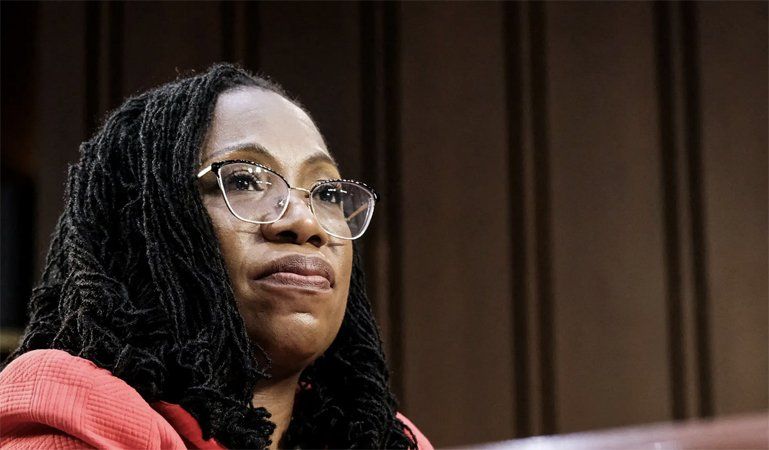Justice Ketanji Brown Jackson clashed with a Louisiana lawyer during oral arguments on Wednesday when the court heard Louisiana v. Callais, a case on whether a majority-minority district in Louisiana discriminated against white people.
Those advocating against the district frequently argued that the plaintiffs in the case demanded a second majority-minority district, but Jackson explained that this is not the case's focus and does not constitute a retrial.
"Where in section two [of the Voting Rights Act] does it mandate another minority district?" asked Jackson. "My understanding, as I explored with Ms. Nelson, is that sectiontwo is the mechanism by which we determine equal electoral opportunity is not being provided for a certain minority group. And we've interpreted in Gingles, we've given some flesh to how one goes about identifying that set of circumstances. But I thought that's the end of it in terms of the court's announcement under section two. And then the court turns to the state and says, 'How do you want to remedy this?'"
She explained that sometimes that means adding another majority minority district, and sometimes it does not.
"Your answer to Justice Barrett was, well, everybody just knows that's the automatic remedy. So, can you help me figure out that disconnect?" Jackson asked Benjamin Aguiñaga, Louisiana solicitor general.
"Justice Jackson, I think there's a reason why this court's voting precedents, going all the way back to Shaw 1, are so tied up with race, it is because the remedy as parties and the courts have understood section two to operate is almost always going to be race," said Aguiñaga.
"They're so tied up with race because that's the initial problem, right? That is the beginning," said Jackson, explaining how the cases were brought. "The beginning is the claim that a person makes under section two, because of their race, they are not being afforded equal electoral opportunity. It is a separate question as to how we go about remedying that..."
Aguiñaga agreed and attempted to continue going on with his statement, but was stopped in his tracks.
"Wait, why is that not a compelling interest to identify areas [where] the problem is occurring?" she asked.
Aguiñaga cited a case that allowed states to remedy the problem, but Jackson paused him again, noting that it isn't the question.
"I'm not talking about the remedy. I'm talking about identify — alright? So, if I'm right, that section two is about identifying the problem and then requiring some remedy," said Jackson. "I don't understand why your answer to Justice Kagan's question about, 'is this a compelling state interest' is 'no.' The answer is obviously yes. That you have an interest in remedying the ills of all discrimination that we identify using this tool, when you go too far in your remedy, is another issue, right?"
That's when things took a more confrontational tone.
Aguiñaga claimed that "step zero" was that the plaintiffs came in and said that they wanted another majority-minority district.
"I thought they came in and said we're not receiving equal electoral opportunity because our votes are being diluted," Jackson shot back.
Aguiñaga claimed it's saying the same thing as saying "we deserve" another district.
"It's not," Jackson shot back. "Trust me on this. Because the second district is a remedy that one could offer for a problem that we have identified. And the whole Robinson litigation was about identifying the problem. Is it really happening?"
In most cases, she said, the court says "you're fine" and "go away. In this case, the court said, I see. I'm looking at the factors. I appreciate what you're saying. You've proven that we have this problem. And so, the next question is how do we go about remedying it?"
Aguiñaga again brought up "intentional discrimination," but Jackson questioned why it even needed to be discussed, as it was not the question before them.
Madiba K. Dennie, who writes for "Balls and Strikes" called the exchange "striking."
"To me, Louisiana was basically like 'here come these Black people always asking for more' and Justice Jackson was like, 'that's not what the f--- they're asking for, they're saying: stop discriminating against us,'" Dennie wrote on Bluesky.
